Table of Content
1. Investment company Business Plan For Starting Your Own Business
The sample business plan for an investment company outlines the creation of an investment company. The company’s mission is to provide clients with access to a wide range of investment opportunities, including stocks, bonds, mutual funds, and alternative investments. The company will also provide financial planning and wealth management services, including portfolio design, asset allocation, and risk management strategies.
The Investment Company’s business plan includes strategies for marketing and advertising, financial projections, and a detailed description of the company’s services and fees. This is the business Plan for Investors who want to invest in a company with a significant probability of success.
2. Sources Of Financing For Investment Firms
In writing a business plan for an investment company, the sources of financing for investment firms typically include private investors, venture capital firms, angel investors, crowdfunding, and debt capital. Private investors are individuals or groups who invest in the company in exchange for equity or a portion of the profits. Venture capital firms provide financing and advice to companies in exchange for equity. Angel investors are wealthy individuals or groups who invest in companies in exchange for equity. Crowdfunding involves the collection of small amounts of money from a large group of people. Debt capital is a loan secured by the company’s assets and must be repaid with interest.
The most common sources of financing for investment firms are debt financing, equity financing, and derivatives. Debt financing involves loans from banks, other lending institutions, or private investors. Equity financing involves the issuance of stock to raise capital. Derivatives are contracts between two parties that derive their value from an underlying asset or benchmark.
The most important source of financing for an investment company in the business plan investment company is the capital that the company brings in from its own operations.
3. Executive Summary Of Investment Company Business Plan
The Business
The new investment company business plan for an Investment Company is designed to provide an overview of our company’s mission and objectives. We are a full-service investment firm that specializes in providing comprehensive financial advice and services to individuals, families, and business owners. We aim to maximize investment returns and increase our clients’ net worth.
We plan to provide a wide range of services, including portfolio management, asset allocation, retirement planning, estate planning, tax planning, and general financial planning.
Management Of Investment Company
The investment company business plan outlines the management team of experienced financial and legal professionals committed to providing the highest quality of investment management services. Our goal is to create a fully integrated, world-class investment company that provides our clients with a range of innovative and tailored investment solutions.
Customers Of Investment Company
In the investment company business plan template, the customers of our investment company will be individuals, small businesses, and institutions that are looking for a trusted financial partner to help them manage and grow their wealth. We will offer our clients a wide range of services, including portfolio management, retirement planning, estate planning, tax planning, and philanthropic planning. Our goal is to provide our clients with the best advice, products, and services to help them meet their financial goals.
Business Target
The business target for our investment company is to create long-term capital appreciation and wealth for our investors by making prudent investments in start-up and established businesses. Our goal is to be a reliable and trusted partner for our investors and maximize their investment return.
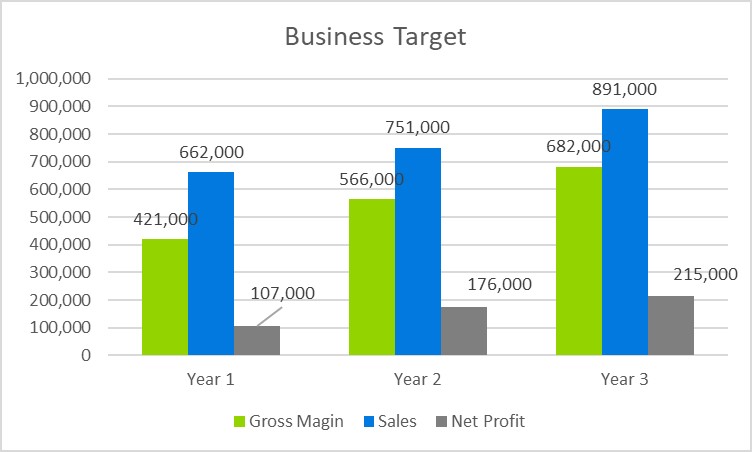
4. Investment Company Summary
Company Owner
Our investment company, JS Investment Group, is owned and operated by John Smith. John Smith is a highly experienced investor and entrepreneur who has successfully founded and managed several small investment company business plans. He deeply understands the investment industry and is passionate about helping others achieve success through strategic investments.
Why The Investment Company Is Being Started
The primary reason for starting an investment company in an investment company business plan sample is to provide clients with a safe and secure place to invest their money. With a wide range of investment options available, our team of experienced financial professionals can help clients make informed decisions about their investments. We also plan to provide clients with up-to-date market analysis and research.
How The Investment Company Will Be Started
The company will seek to raise capital through debt and equity financing. Equity financing will come from the founders and outside investors. The company will also seek to raise capital through debt financing, which will be used to fund the startup costs and ongoing operations of the company. In the business plan for the investment holding company, the company will focus on providing quality investment advice and services to its clients.
Note
The Investment company owner John Smith estimates startup costs based on assets, investments, loans, and expenses in collaboration with financial experts.
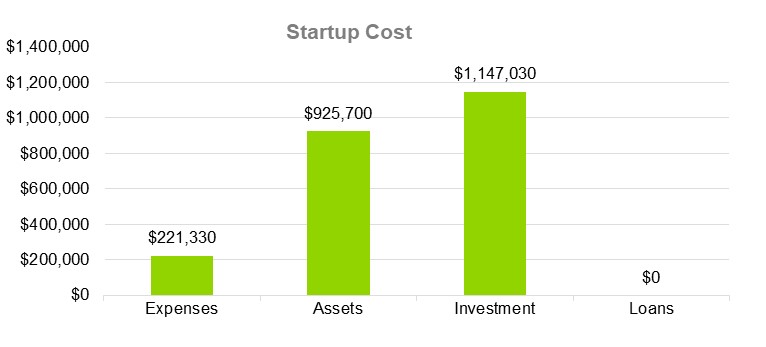
JS Investment Group’s start-up requirements include total startup expenses, total assets, total start-up funding, total funding requirements, total assets, total liabilities, total planned investment, total capital, total liabilities, and total funding.
| Start-up Expenses | |
| Legal | $122,300 |
| Consultants | $0 |
| Insurance | $15,300 |
| Rent | $34,400 |
| Research and Development | $14,300 |
| Expensed Equipment | $31,800 |
| Signs | $3,230 |
| TOTAL START-UP EXPENSES | $221,330 |
| Start-up Assets | $244,000 |
| Cash Required | $173,000 |
| Start-up Inventory | $31,100 |
| Other Current Assets | $225,000 |
| Long-term Assets | $252,600 |
| TOTAL ASSETS | $925,700 |
| Total Requirements | $1,147,030 |
| START-UP FUNDING | |
| Start-up Expenses to Fund | $221,330 |
| Start-up Assets to Fund | $925,700 |
| TOTAL FUNDING REQUIRED | $1,147,030 |
| Assets | |
| Non-cash Assets from Start-up | $1,200,800 |
| Cash Requirements from Start-up | $280,500 |
| Additional Cash Raised | $43,530 |
| Cash Balance on Starting Date | $36,700 |
| TOTAL ASSETS | $1,561,530 |
| Liabilities and Capital | |
| Liabilities | $20,000 |
| Current Borrowing | $0 |
| Long-term Liabilities | $0 |
| Accounts Payable (Outstanding Bills) | $52,000 |
| Other Current Liabilities (interest-free) | $0 |
| TOTAL LIABILITIES | $72,000 |
| Capital | |
| Planned Investment | $1,147,030 |
| Investor 1 | $0 |
| Investor 2 | $0 |
| Other | $0 |
| Additional Investment Requirement | $0 |
| TOTAL PLANNED INVESTMENT | $1,147,030 |
| Loss at Start-up (Start-up Expenses) | $342,500 |
| TOTAL CAPITAL | $1,489,530 |
| TOTAL CAPITAL AND LIABILITIES | $1,561,530 |
| Total Funding | $1,147,030 |
5. Services of Investment Company
The product description section in a business plan for an investment banking company includes services. However, below are the all services offered by our investment company include:
- Investment Advisory: Providing tailored advice and strategies to meet individual, business, and corporate clients’ investment goals.
- Investment Management: The business plan for an investment banking company provides services of designing, constructing, and managing bespoke portfolios for clients, as well as providing ongoing monitoring and rebalancing services.
- Mutual Fund Management: The business plan for an investment management company offers selecting and monitoring mutual funds for clients, as well as providing risk management and portfolio diversification services.
- Estate Planning: Developing strategies for both tax and non-tax-related estate planning objectives.
- Retirement Planning: Assisting clients with the creation of retirement plans and investments to meet their retirement income needs.
- Financial Planning: Helping clients to prepare for their financial future by creating strategies that integrate their investment, tax, insurance, and estate planning goals.
- Risk Management: Identifying and managing investment risks to help clients reach their financial goals.
- Portfolio Analysis: Examining and evaluating portfolios to ensure they are in line with the client’s investment objectives.
- Tax Planning: Developing strategies to minimize the client’s tax liability and maximize after-tax returns.
- Asset Allocation: Designing and implementing asset allocation strategies to help clients meet their long-term financial goals.
6. Marketing Analysis
A marketing analysis is an important part of a sample business plan for an investment company. This analysis provides information on the market in which the company operates, including the size and growth of the market, the competition, and potential growth opportunities.
The investment company market is highly competitive, as investors have a wide range of options when it comes to deciding where to invest their money.
The company will face competition from both traditional and online investment companies. Traditional investment companies offer services such as portfolio management and financial planning. Online investment companies offer services such as stock trading and portfolio management.
In addition to traditional investment companies, investors can choose from online brokers, mutual funds, and other alternative investments. As a result, it is important for an investment company to differentiate itself from the competition and to create a strong value proposition for its customers.
The investment industry is expected to continue to grow as people become more aware of the need for financial planning and the importance of investing.
Market Trends
excellent work
excellent work, competent advice. Alex is very friendly, great communication. 100% I recommend CGS capital. Thank you so much for your hard work!
In order to compete effectively in the investment company market, it is important to understand the current market trends and identify areas of opportunity.
In the investment company business plan example, one of the most important trends to consider is the shift towards more technology-driven investment strategies. This trend is driven by advancements in technology and increased access to data, which has enabled more sophisticated portfolio management techniques.
Additionally, many investors are increasingly looking to alternative investments such as cryptocurrency, venture capital, and private equity as a way of diversifying their portfolios. Furthermore, an increasing number of investors are turning to online trading platforms as a way of managing their investments. Finally, it is important to consider the potential impact of environmental, social, and governance (ESG) investing on the industry, as ESG-focused investments are gaining traction in the financial markets.
Marketing Segmentation
In the private investment company business plan, the company will target a wide range of potential customers, including individual investors, high-net-worth individuals, family offices, and institutional investors. Each of these customer segments will require different strategies and services, so the company will tailor its marketing and services accordingly.
For individual investors, the company will focus on providing personalized services that are tailored to the specific needs and investment goals of each client. The company will also provide educational resources and tools to help clients make informed decisions about their investments.
For high-net-worth individuals, the company will focus on providing personalized portfolio construction and asset management services.
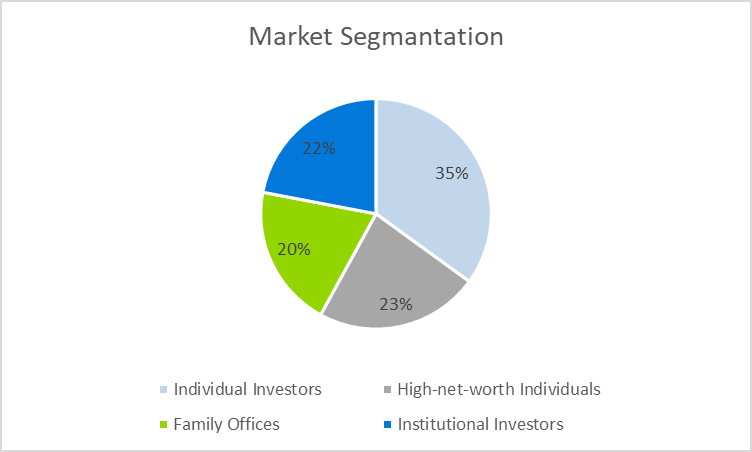
Business Target
We plan to target high-net-worth, individuals and institutional clients who are looking for a more personalized approach to investing. We will use a combination of traditional and alternative investment strategies to provide our clients with the best return on their investments. We plan to use our extensive network of banks and other financial institutions to secure the most attractive terms for our clients.
We have identified three key areas of focus when it comes to our business plan. First, we plan to build a strong customer base by offering superior customer service and customer education. Second, we plan to develop our own proprietary financial products and services to offer our clients. Finally, we plan to focus on developing relationships with banks and other financial institutions to ensure that we can offer the best terms for our clients.
Product Pricing
JS Investment Group will use a combination of fixed fees and performance-based fees for our services. For our portfolio management and asset allocation services, we will charge a flat fee of 1% of the total assets under management. For our investment research and risk management services, we will charge a fixed fee of $250 per hour.
For our performance-based fees, we will charge a 20% fee on any profits earned by our clients. This fee will be applied on a quarterly basis and will be calculated based on the performance of the portfolio during that period.
| Market Analysis | |||||||
| Potential Customers | Growth | Year 1 | Year 2 | Year 3 | Year 4 | Year 5 | CAGR |
| Individual Investors | 35% | 31,500 | 37,800 | 45,360 | 54,432 | 65,318 | 10.00% |
| High-net-worth Individuals | 23% | 30,250 | 36,300 | 43,560 | 52,272 | 62,726 | 10.00% |
| Family Offices | 20% | 21,950 | 26,340 | 31,608 | 37,930 | 45,516 | 10.00% |
| Institutional Investors | 22% | 19,400 | 23,280 | 27,936 | 33,523 | 40,228 | 11.00% |
| Total | 100% | 103,100 | 123,720 | 148,464 | 178,157 | 213,788 | 10% |
7. Marketing Strategy Of Investment Company
Competitive Analysis
EB5 Business Plan
The business plan for an investment company covers the company analysis in which the company’s competitive landscape is large and diverse. There are a number of large and well-established firms that have been in the industry for many years. Additionally, there is a large number of small, independent firms that have emerged in recent years.
Sales Strategy
Our sales strategy is to target potential customers through a variety of outlets, including direct mail, email marketing, social media campaigns, and online advertising. We will focus our efforts on targeting potential customers who are likely to be interested in our services, such as high-net-worth individuals, small business owners, and those with an interest in investing. We will also work to build relationships with local financial advisors and other industry professionals in order to develop a strong referral network.
Sales Monthly
The company’s primary source of revenue will be from the sales of investment products, with a focus on monthly sales. The company will also offer financial advice and portfolio management services, for which it will charge a fee. Experts predict the following sales each month for our company.
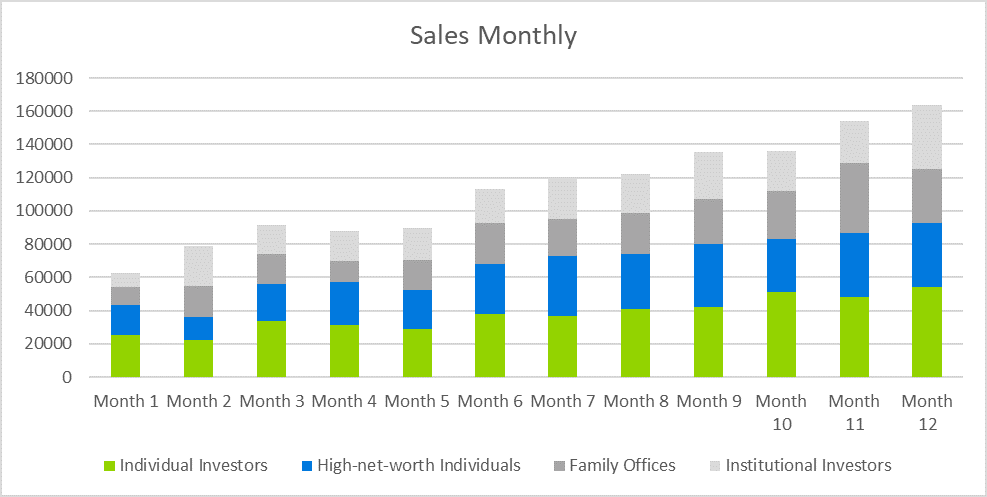
Sales Yearly
The JS Investment Group will generate revenue by selling various services. Experts predict the following sales yearly for our company.
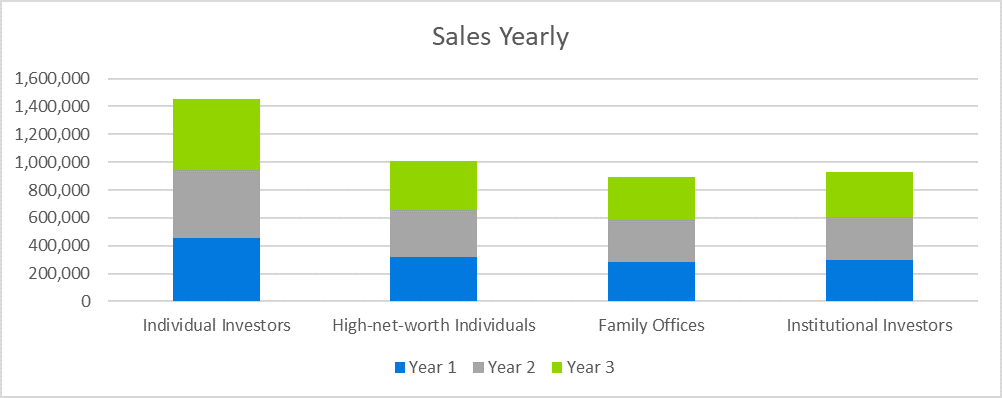
Sales Forecast
Our sales forecast for the next three years predicts a steady increase in revenue. Below is a forecast of sales for our company:
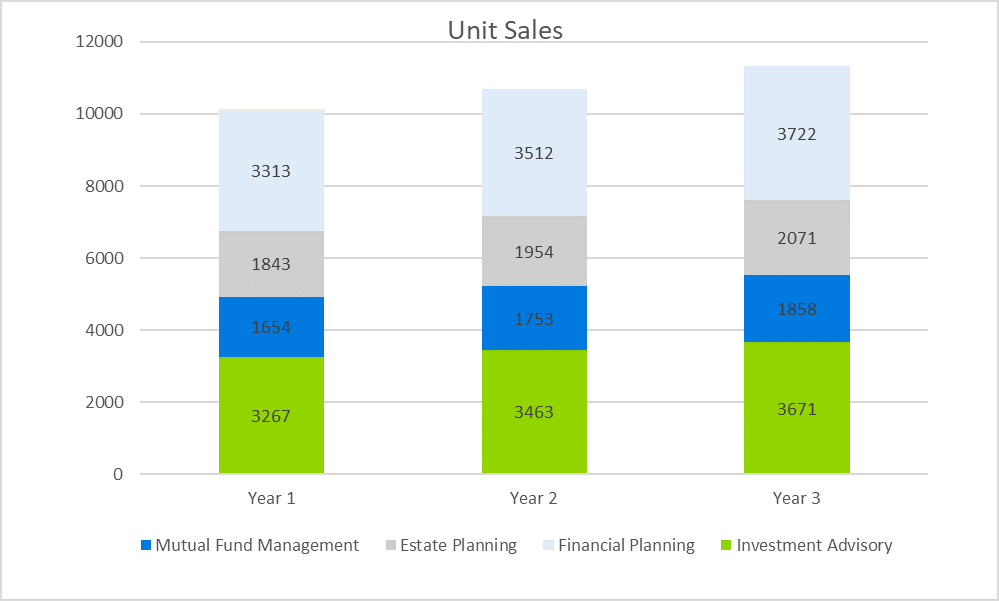
| Sales Forecast | |||
| Unit Sales | Year 1 | Year 2 | Year 3 |
| Investment Advisory | 3,267 | 3,463 | 3,671 |
| Mutual Fund Management | 1,654 | 1,753 | 1,858 |
| Estate Planning | 1,843 | 1,954 | 2,071 |
| Financial Planning | 3,313 | 3,512 | 3,722 |
| TOTAL UNIT SALES | 10,077 | 10,682 | 11,323 |
| Unit Prices | Year 1 | Year 2 | Year 3 |
| Investment Advisory | $422.00 | $489.52 | $567.84 |
| Mutual Fund Management | $1,654.00 | $1,918.64 | $2,225.62 |
| Estate Planning | $492.00 | $570.72 | $662.04 |
| Financial Planning | $987.00 | $1,144.92 | $1,328.11 |
| Sales | |||
| Investment Advisory | $1,378,674.00 | $1,695,217.55 | $2,084,439.50 |
| Mutual Fund Management | $2,735,716.00 | $3,363,836.39 | $4,136,173.23 |
| Estate Planning | $906,756.00 | $1,114,947.18 | $1,370,939.05 |
| Financial Planning | $3,269,931.00 | $4,020,707.16 | $4,943,861.52 |
| TOTAL SALES | $8,291,077.00 | $10,194,708.28 | $12,535,413.30 |
| Direct Unit Costs | Year 1 | Year 2 | Year 3 |
| Investment Advisory | $400.00 | $440.00 | $462.00 |
| Mutual Fund Management | $1,567.00 | $1,723.70 | $1,809.89 |
| Estate Planning | $459.00 | $504.90 | $530.15 |
| Financial Planning | $897.00 | $986.70 | $1,036.04 |
| Direct Cost of Sales | |||
| Investment Advisory | $1,306,800.00 | $1,523,728.80 | $1,695,910.15 |
| Mutual Fund Management | $2,591,818.00 | $3,022,059.79 | $3,363,552.54 |
| Estate Planning | $845,937.00 | $986,362.54 | $1,097,821.51 |
| Financial Planning | $2,971,761.00 | $3,465,073.33 | $3,856,626.61 |
| Subtotal Direct Cost of Sales | $7,716,316.00 | $8,997,224.46 | $10,013,910.82 |
8. Personnel Plan Of Investment Company
Company Staff
The Company Staff will be responsible for the overall management and operation of the investment company. They will be responsible for recruiting and managing a team of qualified and experienced professionals to ensure the success of the business. The JS Investment Group operations will require the following employees:
- CEO
- COO
The management staff includes:
- Marketing Manager
- Operation Manager
- Investment Manager
The operational team includes:
- Front Desk Coordinator
- Investment Advisor
- Security Guards
Other Staff includes:
- Administrative Assistant
- Tax Planner
- Accountant
- Receptionist
Average Salary of Employees
The investment holding company business plan includes the average salary of employees, which varies according to the role of employees and services. We will offer competitive salaries to all our employees to ensure we attract and retain the best talent. The average salary of our employees will be approximately $40,000 per year.
| Personnel Plan | |||
| Year 1 | Year 2 | Year 3 | |
| CEO | $50,000 | $55,000 | $60,500 |
| Chief Financial Officer | $45,000 | $49,500 | $54,450 |
| Marketing Manager | $40,000 | $44,000 | $48,400 |
| Operation Manager | $35,000 | $38,500 | $42,350 |
| Investment Manager | $30,000 | $33,000 | $36,300 |
| Front Desk Coordinator | $30,000 | $33,000 | $36,300 |
| Investment Advisor | $29,000 | $31,900 | $35,090 |
| Administrative Assistant | $28,500 | $31,350 | $34,485 |
| Other Operational Staff | $200,000 | $220,000 | $242,000 |
| Total Salaries | $487,500 | $536,250 | $589,875 |
9. Financial Plan For Investment Company
In collaboration with financial experts, John Smith assessed the company’s financial needs and developed a financial plan for sample of investment company business plan. A three-year financial plan outlines the company’s development.
Important Assumptions
The following are important assumptions for the financial plan of the investment company:
| General Assumptions | |||
| Year 1 | Year 2 | Year 3 | |
| Plan Month | 1 | 2 | 3 |
| Current Interest Rate | 8.25% | 8.28% | 8.29% |
| Long-term Interest Rate | 7.21% | 7.26% | 7.28% |
| Tax Rate | 21.06% | 21.08% | 21.09% |
| Other | 0 | 0 | 0 |
Deviations, however, are expected to be limited to levels that do not impact the investment company’s major financial goals.
Brake-even Analysis
The following is a breakdown of the investment company’s fixed and variable costs:
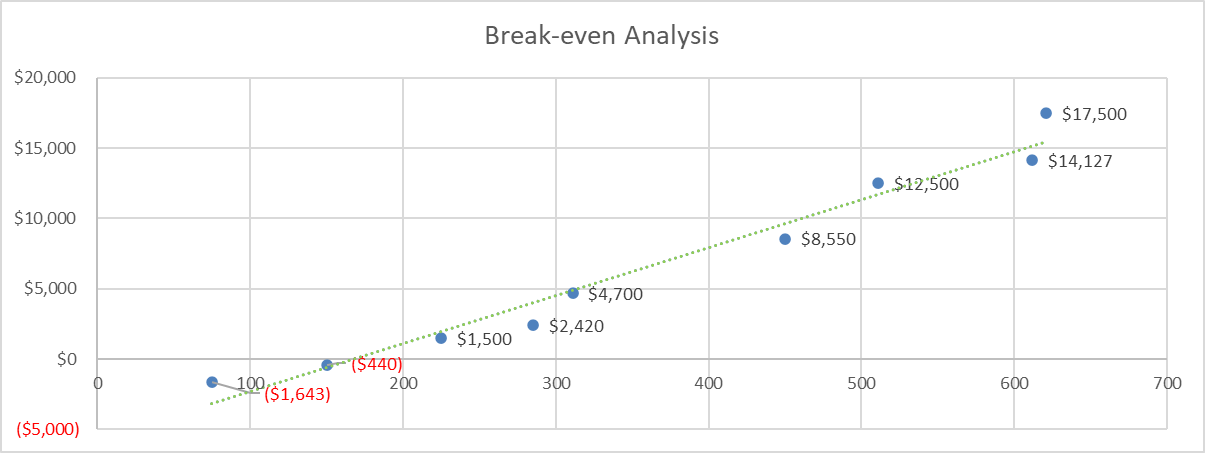
The following table shows an analysis of monthly break-evens of an investment company
| Break-Even Analysis | |
| Monthly Units Break-even | 4175 |
| Monthly Revenue Break-even | $178,534 |
| Assumptions: | |
| Average Per-Unit Revenue | $321.00 |
| Average Per-Unit Variable Cost | $0.64 |
| Estimated Monthly Fixed Cost | $187,653 |
Projected Profit and Loss
The following is the projected profit and loss for an investment company.
| Pro Forma Profit And Loss | |||
| Year 1 | Year 2 | Year 3 | |
| Sales | $8,291,077 | $10,194,708 | $12,535,413 |
| Direct Cost of Sales | $7,716,316 | $8,997,224 | $10,013,911 |
| Other | $0 | $0 | $0 |
| TOTAL COST OF SALES | $7,716,316 | $8,997,224 | $10,013,911 |
| Gross Margin | $574,761 | $1,197,484 | $2,521,502 |
| Gross Margin % | 6.93% | 11.75% | 20.12% |
| Expenses | |||
| Payroll | $28,500 | $31,350 | $34,485 |
| Sales and Marketing and Other Expenses | $127,543 | $128,985 | $129,876 |
| Depreciation | $2,300 | $2,486 | $2,500 |
| Leased Equipment | $0 | $0 | $0 |
| Utilities | $2,650 | $2,920 | $2,900 |
| Insurance | $2,830 | $2,830 | $2,830 |
| Rent | $3,287 | $3,586 | $3,786 |
| Payroll Taxes | $24,058 | $25,000 | $26,000 |
| Other | $0 | $0 | $0 |
| Total Operating Expenses | $191,168 | $197,157 | $202,377 |
| Profit Before Interest and Taxes | $383,593 | $1,000,327 | $2,319,125 |
| EBITDA | $383,593 | $1,000,327 | $2,319,125 |
| Interest Expense | $0 | $0 | $0 |
| Taxes Incurred | $76,719 | $200,065 | $463,825 |
| Net Profit | $306,874 | $800,261 | $1,855,300 |
| Net Profit/Sales | 3.70% | 7.85% | 14.80% |
Profit Monthly
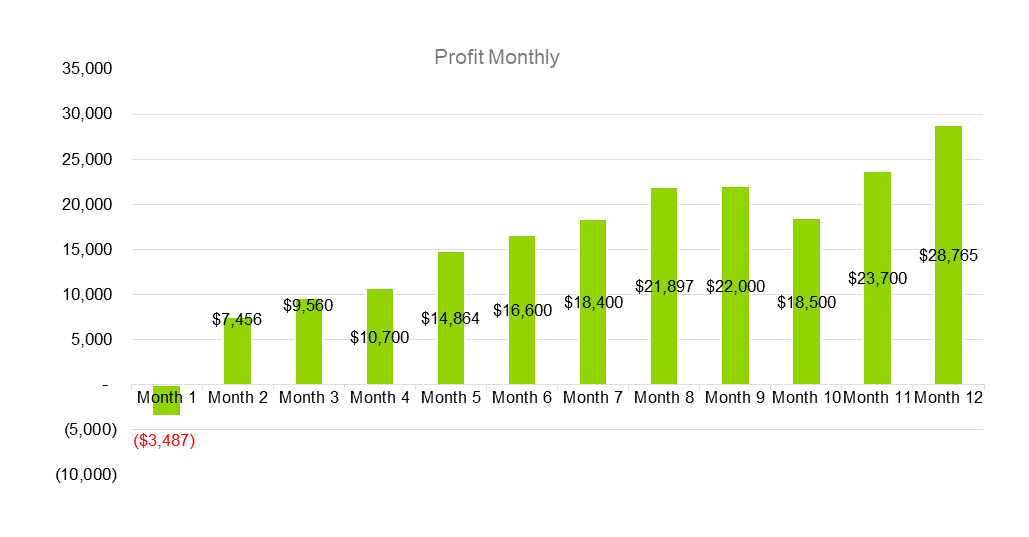
Profit Yearly
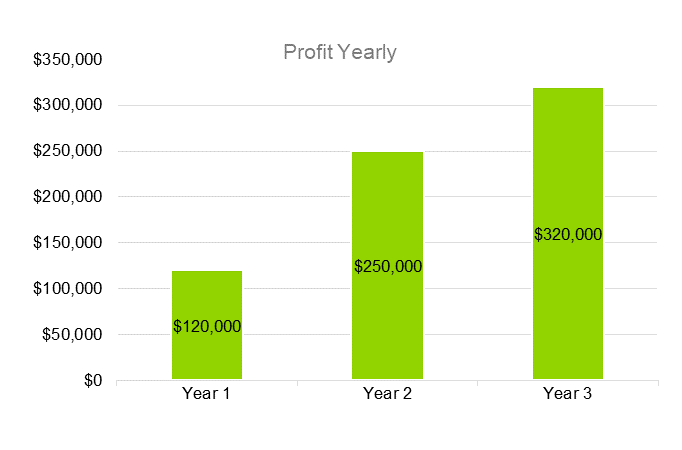
Gross Margin Monthly
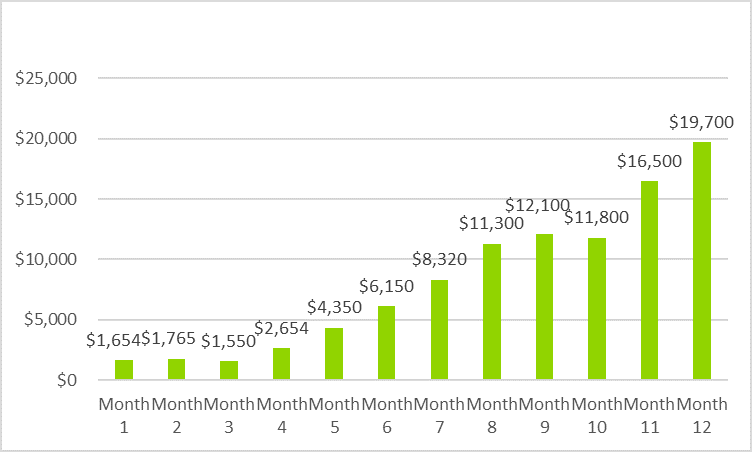
Gross Margin Yearly
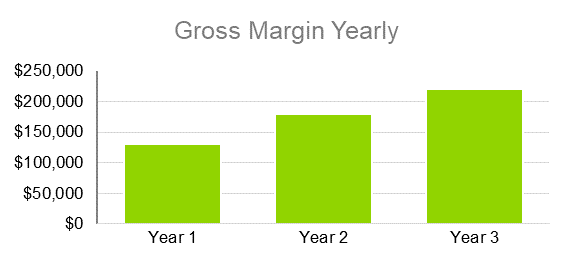
Projected Cash Flow
The following column diagram shows cash flow projections.
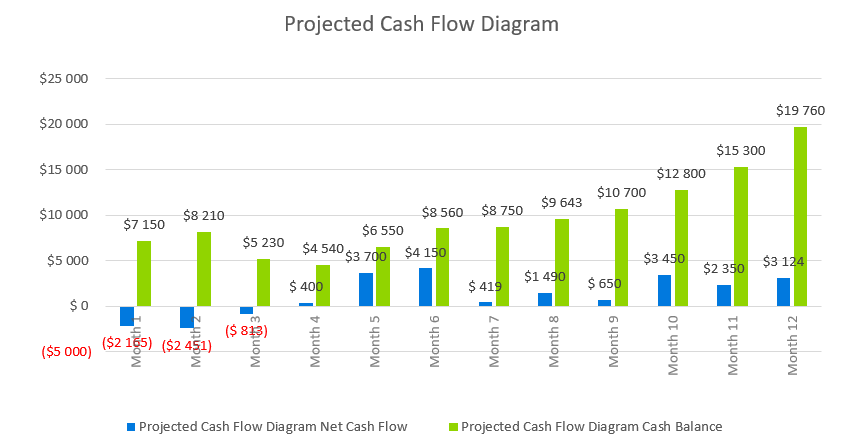
The following table shows the pro forma cash flow of an private equity firm business plan. The cash flow statement includes cash received from operations, cash received from operations, and general assumptions.
| Pro Forma Cash Flow | |||
| Cash Received | Year 1 | Year 2 | Year 3 |
| Cash from Operations | |||
| Cash Sales | $54,321 | $58,667 | $63,360 |
| Cash from Receivables | $22,600 | $24,408 | $26,361 |
| SUBTOTAL CASH FROM OPERATIONS | $76,921 | $83,844 | $90,551 |
| Additional Cash Received | |||
| Sales Tax, VAT, HST/GST Received | $0 | $0 | $0 |
| New Current Borrowing | $0 | $0 | $0 |
| New Other Liabilities (interest-free) | $0 | $0 | $0 |
| New Long-term Liabilities | $0 | $0 | $0 |
| Sales of Other Current Assets | $0 | $0 | $0 |
| Sales of Long-term Assets | $0 | $0 | $0 |
| New Investment Received | $0 | $0 | $0 |
| SUBTOTAL CASH RECEIVED | $76,543 | $79,765 | $82,346 |
| Expenditures | Year 1 | Year 2 | Year 3 |
| Expenditures from Operations | |||
| Cash Spending | $39,876 | $41,500 | $43,987 |
| Bill Payments | $25,500 | $27,500 | $29,500 |
| SUBTOTAL SPENT ON OPERATIONS | $65,376 | $69,000 | $73,487 |
| Additional Cash Spent | |||
| Sales Tax, VAT, HST/GST Paid Out | $0 | $0 | $0 |
| Principal Repayment of Current Borrowing | $0 | $0 | $0 |
| Other Liabilities Principal Repayment | $0 | $0 | $0 |
| Long-term Liabilities Principal Repayment | $0 | $0 | $0 |
| Purchase Other Current Assets | $0 | $0 | $0 |
| Purchase Long-term Assets | $0 | $0 | $0 |
| Dividends | $0 | $0 | $0 |
| SUBTOTAL CASH SPENT | $62,900 | $67,932 | $73,367 |
| Net Cash Flow | $22,200 | $23,578 | $24,987 |
| Cash Balance | $28,765 | $29,097 | $32,864 |
Projected Balance Sheet
Below is a projected balance sheet of an investment holding Company Business Plan that shows data about the pro forma balance sheet, total current assets, total long-term assets, total assets, current subtotal liabilities, total liabilities, total capital, and total liabilities.
| Pro Forma Balance Sheet | |||
| Assets | Year 1 | Year 2 | Year 3 |
| Current Assets | |||
| Cash | $293,542 | $328,767 | $361,644 |
| Accounts Receivable | $25,987 | $29,105 | $32,715 |
| Inventory | $4,321 | $4,840 | $4,900 |
| Other Current Assets | $2,587 | $2,587 | $2,587 |
| TOTAL CURRENT ASSETS | $326,437 | $365,299 | $401,845 |
| Long-term Assets | |||
| Long-term Assets | $9,765 | $9,765 | $9,765 |
| Accumulated Depreciation | $18,200 | $20,384 | $22,932 |
| TOTAL LONG-TERM ASSETS | $28,300 | $31,696 | $35,658 |
| TOTAL ASSETS | $354,737 | $396,995 | $437,503 |
| Liabilities and Capital | Year 4 | Year 5 | Year 6 |
| Current Liabilities | |||
| Accounts Payable | $19,800 | $22,176 | $24,926 |
| Current Borrowing | $0 | $0 | $0 |
| Other Current Liabilities | $0 | $0 | $0 |
| SUBTOTAL CURRENT LIABILITIES | $19,800 | $22,176 | $24,926 |
| Long-term Liabilities | $0 | $0 | $0 |
| TOTAL LIABILITIES | $16,700 | $18,704 | $21,023 |
| Paid-in Capital | $49,237 | $61,810 | $66,837 |
| Retained Earnings | $58,500 | $63,765 | $70,142 |
| Earnings | $174,000 | $189,660 | $208,626 |
| TOTAL CAPITAL | $338,037 | $378,291 | $416,479 |
| TOTAL LIABILITIES AND CAPITAL | $354,737 | $396,995 | $437,503 |
| Net Worth | $298,760 | $325,648 | $358,213 |
Business Ratios
The following table shows business ratios, ratio analysis, and total assets.
| Ratio Analysis | ||||
| Year 1 | Year 2 | Year 3 | INDUSTRY PROFILE | |
| Sales Growth | 8.23% | 9.12% | 10.10% | 3.00% |
| Percent of Total Assets | ||||
| Accounts Receivable | 8.23% | 9.12% | 10.10% | 9.80% |
| Inventory | 6.33% | 7.01% | 7.77% | 9.90% |
| Other Current Assets | 3.21% | 3.56% | 3.94% | 2.40% |
| Total Current Assets | 147.30% | 146.00% | 147.00% | 153.00% |
| Long-term Assets | 12.52% | 11.55% | 11.59% | 11.70% |
| TOTAL ASSETS | 100.00% | 100.00% | 100.00% | 100.00% |
| Current Liabilities | 4.85% | 4.89% | 4.93% | 4.34% |
| Long-term Liabilities | 0.00% | 0.00% | 0.00% | 0.00% |
| Total Liabilities | 7.44% | 7.50% | 7.57% | 7.38% |
| NET WORTH | 100.06% | 100.86% | 101.79% | 110.00% |
| Percent of Sales | ||||
| Sales | 100.00% | 100.00% | 100.00% | 100.00% |
| Gross Margin | 95.65% | 98.23% | 100.98% | 99.00% |
| Selling, General & Administrative Expenses | 95.80% | 98.39% | 101.14% | 97.80% |
| Advertising Expenses | 1.53% | 1.57% | 1.62% | 1.40% |
| Profit Before Interest and Taxes | 41.90% | 43.03% | 44.24% | 33.90% |
| Main Ratios | ||||
| Current | 36 | 37 | 38 | 39 |
| Quick | 34 | 34.2 | 35.055 | 33 |
| Total Debt to Total Assets | 0.17% | 0.17% | 0.17% | 0.40% |
| Pre-tax Return on Net Worth | 72.68% | 74.24% | 75.00% | 75.00% |
| Pre-tax Return on Assets | 94.88% | 99.62% | 104.61% | 111.30% |
| Additional Ratios | Year 1 | Year 2 | Year 3 | |
| Net Profit Margin | 354.51% | 365.50% | 376.83% | N.A. |
| Return on Equity | 56.20% | 57.94% | 59.74% | N.A. |
| Activity Ratios | ||||
| Accounts Receivable Turnover | 7.9 | 7.9 | 8 | N.A. |
| Collection Days | 100 | 100 | 100 | N.A. |
| Inventory Turnover | 32.3 | 33.915 | 32 | N.A. |
| Accounts Payable Turnover | 15.9 | 17 | 16.3 | N.A. |
| Payment Days | 27 | 27 | 27 | N.A. |
| Total Asset Turnover | 2.45 | 2.5 | 2.6 | N.A. |
| Debt Ratios | ||||
| Debt to Net Worth | -0.05 | -0.04 | -0.05 | N.A. |
| Current Liab. to Liab. | 1 | 1 | 1 | N.A. |
| Liquidity Ratios | ||||
| Net Working Capital | $247,000 | $260,832 | $275,439 | N.A. |
| Interest Coverage | 0 | 0 | 0 | N.A. |
| Additional Ratios | ||||
| Assets to Sales | 0.8 | 0.87 | 0.89 | N.A. |
| Current Debt/Total Assets | 1% | 0% | 0% | N.A. |
| Acid Test | 27.06 | 28.12 | 28.75 | N.A. |
| Sales/Net Worth | 2.3 | 2.4 | 2.6 | N.A. |
| Dividend Payout | 0 | 0 | 0 | N.A. |
10. Get the Expertise to Create a Winning Business Plan!
“Start Your Investment Company with Professional Assistance: Get the Support of OGS Capital’s Expert Team!”
At OGS Capital, our experienced consultants provide professional assistance to help you start and grow your investment company. Our team has in-depth knowledge and expertise in launching businesses, and we understand the complexities of the investment industry. We can provide expert advice and guidance to help you create and execute a custom sample business plan for investment holding company that will ensure your investment company’s success.
We can help you with the entire process of developing your business, from crafting a comprehensive financial plan to finding appropriate funding sources. With our knowledge and resources, we can help you create a detailed business plan that will serve as a roadmap for your business.
FAQ
- What is the main business of an investment company?
The main business of an investment company is to manage investments and provide financial advice and solutions to their clients. They may provide services such as portfolio management, asset allocation, retirement planning and financial planning. They may also offer a variety of other services such as stock and bond trading, insurance, estate planning and tax planning. - Can I create my own investment company?
Yes, you can create your own investment company. The process involves registering the company with the SEC, registering with the state in which you will be doing business, setting up the necessary accounts and paperwork, and finding clients. You should also consult a qualified accountant, lawyer, and financial adviser to ensure you have all the appropriate information and documents in place. - How much does it cost to start an investment firm?
The cost of starting an investment firm will vary depending on the type of firm you are looking to establish and the services you plan to provide. Typically, startup costs can range from $5,000 to $50,000, depending on the complexity of the business. Costs may include office equipment, legal and accounting fees, licensing fees, technology costs, marketing costs, and other miscellaneous costs.
Download Investment Company Business Plan Sample in pdf
OGSCapital’s team has assisted thousands of entrepreneurs with top-rate business plan development, consultancy and analysis. They’ve helped thousands of SME owners secure more than $1.5 billion in funding, and they can do the same for you.



















